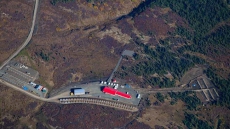VANCOUVER — A Vancouver-area city is asking the National Energy Board to hand Kinder Morgan a bill that could be worth more than $2 million for policing and cleanup costs after pipeline work was targeted by protesters last month.
Environmental activists set up a makeshift encampment in a conservation area on Burnaby Mountain, east of Vancouver, in an attempt to block crews from conducting drilling and survey work related to its proposal to expand the Trans Mountain pipeline.
The company obtained a court injunction ordering protesters to clear two drilling sites. Dozens of officers with the RCMP and other police agencies were on the scene for over a week, arresting more than 100 people by the time the work was finished.
Burnaby Mayor Derek Corrigan, who has been a vocal opponent of the planned pipeline expansion, has publicly said the company, not taxpayers, should be on the hook for policing costs.
The city wrote the National Energy Board a letter earlier this month, indicating it plans to seek an order from the board forcing Kinder Morgan to pay for the entire police bill — which it estimates to be between $1 million and $2 million — as well as any work required to restore the conservation area where the work occurred.
"When Trans Mountain went to B.C. Supreme Court for an injunction against the public, and sought and received authority to engage a police presence in the conservation area ... it did so knowing the likely consequences," says the city's letter, dated Dec. 5.
"The presence of many police officers ... has resulted in further damage to the conservation area at great public expense, much of which will be paid by Burnaby. Large areas of the conservation area were fenced off, and the public road was fully closed. More areas of the park were trampled."
The letter says the company was required by the energy board to do "as little damage as possible" during its work. The city, however, says there was extensive damage that went "well beyond" what the company had initially promised.
The city's letter does not include a final tally of the cleanup costs.
The company submitted its own response to the board, saying it is prepared to pay for cleanup and remediation work while suggesting police costs are the responsibility of the city.
A letter written by a company lawyer says the city could have mitigated the damage to the mountain by enforcing bylaws that the protesters were breaking. Those include bylaws preventing anyone from setting up a structure in a city parks or damaging trees, shrubs and parkland.
"Instead, Burnaby, having sat on its hands, now turns to Trans Mountain for compensation for damage caused by third parties," the letter says.
The letter goes on to say it was the protesters, not the company, that prompted the need for such a significant police presence.
"Trans Mountain is not in control of third parties who decided to break the law," the letter says.
"The police were required to maintain public order and safety. Policing costs are a service provided to taxpaying citizens and corporations in Burnaby, including Trans Mountain, to protect their lawful rights."
The company's letter says that Kinder Morgan is prepared to pay for cleanup work, even for damage caused by the protesters, and it is open to negotiating with the city on that issue.
However, the company says it would be premature for the city to demand money before the cleanup work is finished and a final cost is determined. Also, the company says the National Energy Board Act outlines a process for such compensation, which includes a period of negotiation followed by arbitration, which hasn't happened.
The National Energy Board wrote the city on Dec. 12 indicating that the board won't do anything until it receives the city's formal application.
The Trans Mountain pipeline currently carries Alberta crude to a waterfront terminal in Burnaby. If approved, the expanded pipeline's capacity would triple, allowing it to transport 900,000 barrels of oil a day.
Opponents have warned about the possibility of a spill, either from the pipeline or the increased tanker traffic it would require. They also cite larger environmental concerns around Alberta's oilsands.





